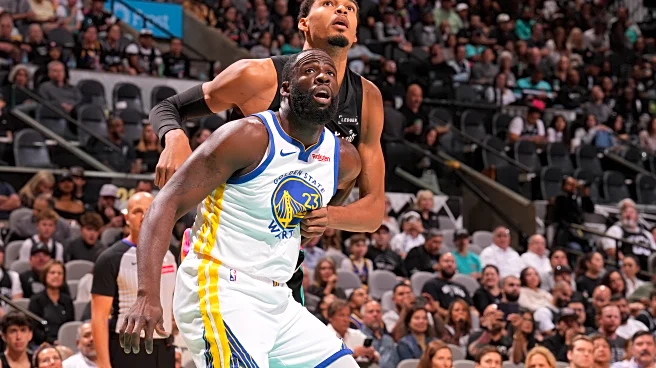The Frost Bank Center was hostile Tuesday night. That haunting “Seven Nation Army” chant echoed through San Antonio as Victor Wembanyama bounced to halfcourt, towering over everyone like basketball’s newest
impossibility. The Spurs had their crowd ready, their system humming, and their generational talent primed to feast on a Warriors team that looked lost 24 hours earlier in Oklahoma City.
This was supposed to be a scheduled loss. Back-to-backs are brutal. Road-weary legs, wounded egos, and that now-infamous postgame commentary from Draymond Green about personal agendas fracturing team commitment. Green’s postgame comments after the Thunder blowout felt charged with urgency. “I think everybody was committed to winning [back then] and doing that any way possible,” he said, referencing last season’s post-Jimmy Butler trade surge.
Butler echoed those thoughts: “Everybody might have to sacrifice something. I can’t tell you what that sacrifice might be for every individual. It may be different for every individual, every single night.” These weren’t idle complaints. These were veterans watching a 6-6 team drift, watching young players navigate contract ambitions against championship windows, watching road losses pile up like evidence of something broken. Leadership isn’t always inspirational. Sometimes it’s just honest inventory of what’s failing.
Not that everyone will understand that, of course.
Stephen Curry responded to the leadership conversation was characteristically humility. “I kind of fell into [the agenda thing] a little bit myself,” he admitted, owning his share of the Oklahoma City disaster. “Trying to get myself going. But the bigger issue when you lose is you start to look around and figure out what’s the issue.”
Then he stopped talking and started cooking. He did what the greatest player in franchise history does when his team needs reminding about who they are. He delivered 46 points. 15-of-16 from the free throw line, with a nuclear third quarter that silenced 18,578 hostile witnesses. The Warriors roared back from a 16-point deficit to beat the Spurs 125-120, not because they ran from the tension, but because they ran directly through it with leadership both on and off the court.
Vocal leadership without execution is just noise. Green went 1-for-10 from the field, 0-for-7 from three, posting the kind of offensive line that would get most players crucified on social media and talking head shows on cable television. Yet his value transcends shooting percentages. He contributed five rebounds, four assists, and the kind of defensive orchestration that turned Wembanyama into a turnover machine. The players Draymond defended shot just 5-of-16 from the field (31.3%). But let’s zoom in and to be clear about what Draymond accomplished against Wembanyama. The French phenom finished with 31 points, 15 rebounds, and 10 assists. Those are video game numbers. But the efficiency tells a different story.
When Green was his primary defender, Wemby shot just 4-of-12 from the field. Five of his eight turnovers came with Draymond in his space, disrupting passing lanes and forcing the kind of uncomfortable decisions that even 7-foot-4 generational talents struggle with. This is what sacrifice looks like for Green creeping into his late-30s on a night when his three-point shot has abandoned him. You accept that your offensive role is spacing the floor and trying to make the right reads, while you pour everything else into making the other team’s best player miserable. You accept that the box score will look ugly. You accept that casual fans will wonder why you’re still getting major minutes.
And you do it anyway, because winning matters more than looking good in the stat sheet.
That’s the sacrifice Butler was talking about. Green’s offensive game was cooked last night and that 0-for-7 from three was a nightmare. But his willingness to guard the league’s most unique physical specimen, to make Wembanyama work for every possession, to turn a 31-point triple-double into something that felt strangely inefficient? That’s championship DNA. That’s what happens when a veteran decides his role is neutralizing generational talent rather than chasing his own numbers.
Mr. Butler added 28 points on ridiculous efficiency (7-12 FG, 5-7 3PT), six rebounds, eight assists, three steals, and the steady veteran presence of someone who’s been through deep playoff runs before. What a weapon this guy is on both ends on the floor. He demands a double team with the ball in his hands, he’s unselfish, and if you give him a glimmer of daylight from beyond the arc or around the rim you’re toast. Jimmy Buckets went to WORK.
The Warriors are now 7-6, still navigating a brutal early schedule that’s exposed legitimate flaws. The road struggles remain real. The questions about commitment and sacrifice that Green and Butler raised haven’t been fully answered by one victory.
But championship teams respond to adversity. They answer tough conversations with tougher performances. They find ways to win games they’re supposed to lose because their best player decides that losing twice in a row is unacceptable, and because their defensive anchor decides that making Wembanyama uncomfortable is more important than his own offensive rhythm.
The Spurs got a triple-double from their generational talent and still lost because the Warriors bent the shootout their way. They went 15-for-15 from the free throw line in that third quarter. Perfect blend of hot shooting and relentless attacking. That’s championship DNA reasserting itself.
Leadership comes in different languages. Green and Butler spoke the language of accountability, demanding more from teammates and themselves, then backing it up with gritty defensive work that won’t make highlight reels. Curry spoke the language of execution, answering questions with 46 points and the kind of third quarter that reminds everyone why this dynasty happened in the first place.
Whether this represents a sustainable turnaround or just a momentary flash of greatness remains uncertain. The schedule doesn’t get easier. The roster questions don’t disappear. Green’s offensive struggles are real and concerning. But for one night in San Antonio, with hostile crowds and wounded egos and back-to-back exhaustion, the Warriors remembered exactly who they are. And who are they the naysayers may ask?
A team led by arguably the greatest point guard ever, who responds to adversity by going nuclear. A team with a defensive anchor willing to sacrifice his offensive pride to neutralize generational talents. A team with veterans who know how to demand accountability and then deliver it themselves. A team that, when properly motivated, can still silence buildings and bend games toward their collective will.
That’s what leadership looks like when it actually matters. Three messengers. One message. Let’s get right together.
The road ahead is still brutal. The questions about this team’s ceiling remain legitimate. But on Tuesday night in San Antonio, the Warriors showed they still know how to answer when challenged. That’s worth remembering when the next losing streak inevitably arrives.









